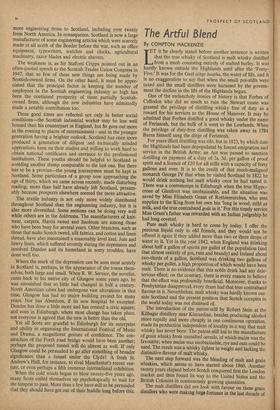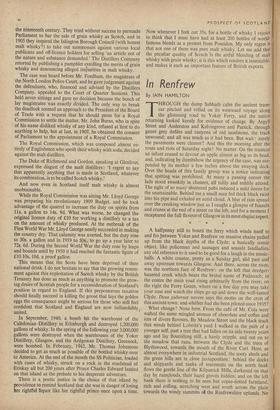The Artful Blend
By COMPTON MACKENZIE LET it be clearly stated before another sentence is written that the true whisky of Scotland is malt whisky distilled from a mash consisting entirely of malted barley. It was hardly known outside the Highlands until after the 'Forty- Five.' It was for the Gael ttisge beatha, the water of life, and it is no exaggeration to say that when the small pot-stills were taxed and the small distillers were harassed by the govern- ment the decline in the life of the Highlands began.
One of the melancholy ironies of history is that Forbes of Culloden who did so much to ruin the Stewart cause was granted the privilege of distilling whisky free of duty as a reward for his services to the House of Hanover. It may be admitted that Forbes distilled a good whisky under the name of Ferintosh, but the bulk of it went to the Lowlands. When the privilege of duty-free distilling was taken away in 1784 Burns himself sang the dirge of Ferintosh.
For years illicit distilling was rife, but in 1823, by which date the Highlands had been depopulated by forced emigration and service in the British Army, an Act was passed to sanction distilling on payment of a duty of 2s. 3d. per gallon of proof spirit and a licence of f10 for all stills with a capacity of forty gallons and over. It is to the credit of that much-maligned monarch George IV that when he visited Scotland in 1822 he would drink nothing but malt whisky once he had tasted it. There was a contretemps in Edinburgh when the true Hippo- crene of Glenlivct was unobtainable, and the situation was saved 'by Miss Elizabeth Grant of Rothiemurchus, who sent supplies to the King from her own bin 'long in wood, mild as milk, and the true contraband gofit in it.' For this timely service Miss Grant's father was rewarded with an Indian judgeship he had long coveted.
Pure malt whisky is hard to come by today. I offer the precious liquid only to old friends, and they would not be offered it again if they added more than two or three drops of water to it. Yet in the year 1842, when England was drinking about half a gallon of spirits per gullet of the population (and that almost entirely of gin, rum and brandy) and Ireland about two-thirds of a gallon, Scotland was drinking two gallons of whisky per gullet, a high proportion of which would have been malt. There is no evidence that this noble drink had any dele- terious effect; on the contrary, there is every reason to believe that the effect was profoundly beneficial. Moreover, thanks to Presbyterian disapproval, every dram had that true contraband flavour in it. Nevertheless, malt whisky was hardly known out- side Scotland and the present position that Scotch occupies in the world today was not dreamed of.
The introduction of the patent-still by Robert Stein at the Kilbagie distillery near Kincardine, besides producing alcohol more rapidly and more cheaply in one continuous operation, made its production independent of locality in a way that malt whisky has never been. The patent-still led to the manufacture of grain whisky from unmalted cereals, of which maize was the favourite; when maize was unobtainable, rye and oats could be used. The result was a whisky lighter in weight and lacking the distinctive flavour of malt whisky. the nineteenth century. They tried without success to persuade Parliament to bar the sale of grain whisky as Scotch, and in 1905 they inspired the Islington Borough Council (with honest malt whisky?) to take out summonses against various local publicans and off-licence holders for selling 'an article not of the nature and substance demanded.' The Distillers Company retorted by publishing a pamphlet extolling the merits of grain whisky and denouncing alleged imfmrities in malt whisky.
The case was heard before Mr. Fordham, the magistrate of the North London Police Court, and he gave judgement against the defendants, who, financed and advised by the Distillers Company, appealed to the Court of Quarter Sessions. This held seven sittings and gave no decision because the bench of lay magistrates was exactly divided. The only way to break the deadlock seemed an approach to the President of the Board of Trade with a request that he should press for a Royal Commission to settle the matter. Mr. John Burns, who in spite of his name disliked whisky of any kind, refused at first to do anything to help, but at last, in 1907, he obtained the consent of Parliament to the appointment of a Royal Commission.
The Royal Commission, which was composed almost en- tirely of Englishmen who spoilt their whisky with soda, decided against the malt distillers.
The Duke of Richmond and Gordon, speaking at Glenlivet, expressed the disgust of the malt distillers: 'I regret to say that apparently anything that is made in Scotland, whatever its combination, is to be called Scotch whisky.'
And now even in Scotland itself malt whisky is almost unobtainable.
While the Royal Commission was sitting Mr. Lloyd George was preparing his revolutionary 1909 Budget, and he took advantage of the quarrel to increase the duty on spirits from us, a gallon to 14s. 9d. What was worse, he clianged the original licence duty of £10 for working a distillery to a tax on the amount of whisky produced. At the outbreak of the First World War Mr. Lloyd George nearly succeeded in making the country dry. That calamity was averted, but the duty rose to 30s. a gallon and in 1919 to 50s., to go up a year later to 72s. 6d. During the Second World War the duty rose by leaps and bounds until by 1950 it had reached the fantastic figure of £10 10s. 10d. a proof gallon.
This means that the Scots have been deprived of their national drink. I do not hesitate to say that the growing resent- ment against this exploitation of Sootch whisky by the British Treasury has done as much as anything to promote the grow- ing desire of Scottish people for a reconsideration of Scotland's position in regard to England. If this preposterous taxation should finally succeed in killing the goose that lays the golden eggs the consequence might be serious for those who still feel confident that Scotland and England are now indissolubly united.
In September, 1940, a bomb hit the warehouse of the Caledonian .Distillery in Edinburgh and destroyed 1,200,000 gallons of whisky. In the spring of the following year 3,000,000 gallons were destroyed when the warehouses of the Yoker Distillery, Glasgow, and the Ardgowan Distillery, Greenock, were bombed. In February, 1942, Mr. Thomas Johnstone decided to get as much as possible of the bottled whisky over to America. At the end of the month the SS Politician, loaded with cases of whisky, struck on a rock in the roadstead of • Eriskay all but 200 years after Prince Charles Edward landed on that island as the prelude to his desperate adventure.
There is a, poetic justice in the choice of that island by providence to remind Scotland that she was in danger of losing her rightful liquor like her rightful prince once upon a time. Now whenever I fork out 35s. for a bottle of whisky I rejoice to think that I must have had at least 200 bottles of world- famous blends as a present from Poseidon. My only regret is that not one of them was pure malt whisky. Let me add that the peculiar quality of Scotch is the artful blending of mall whisky with grain whisky; it is this which renders it inimitable. and makes it such an important feature of British exports.


















































 Previous page
Previous page